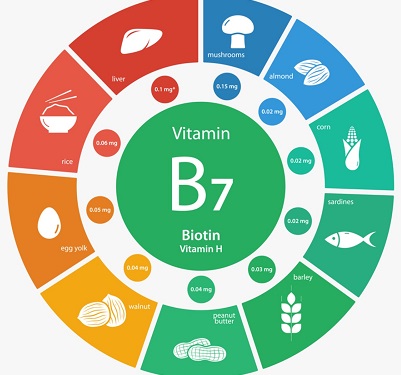 Before getting to know biotin side effects, let's first get to know this medication better. Biotin may be known as vitamin B7 or vitamin H. This water-soluble B-complex helps specific enzymes throughout the body function more efficiently. You can get biotin from a variety of food sources such as cucumber, oats, dried fruit, eggs, cabbage, goat or cow's milk, cauliflower, royal jelly, raspberries, brewer's yeast or strawberries. You have a recommended dietary allowance that is very low for biotin.
Before getting to know biotin side effects, let's first get to know this medication better. Biotin may be known as vitamin B7 or vitamin H. This water-soluble B-complex helps specific enzymes throughout the body function more efficiently. You can get biotin from a variety of food sources such as cucumber, oats, dried fruit, eggs, cabbage, goat or cow's milk, cauliflower, royal jelly, raspberries, brewer's yeast or strawberries. You have a recommended dietary allowance that is very low for biotin.
Children should not get more than 5-12 units of biotin a day and adults should not get more than 20-30 units. It is rare that people suffer from a biotin deficiency, but it is possible. Those that are suffering from a biotin deficiency can take supplements to make up this difference. However, knowing the necessity and potential side effects of biotin can help you better determine if you need to take a supplement at all.
Biotin Side Effects
- Acne. Getting too much biotin in your system increases your risk of developing cystic acne on the chin and jawline. The reason why this occurs is unknown, but it is found that the acne fades a few weeks after you stop using biotin supplements. Make sure you take doses of biotin that are less than 2500 mcg or less each day and drink plenty of water while using biotin supplements to reduce your risk of developing cystic acne. You may need to experiment with different doses until you find the amount that works best with your skin.
- Allergies. Allergic reactions to biotin are not common, but they are still possible. People that have known allergies to vitamin B12 cobalamin or cobalt tend to be allergic to biotin as well. If you are suffering from an allergic reaction to biotin you may feel nausea, develop an itchy rash, tightness or pain in your chest and swelling of the throat and face. If you start to develop these symptoms call your doctor for help immediately as some of these developments can be fatal.
- Miscarriage. If you are taking high doses of biotin while you are trying to get pregnant it can increase your risk of suffering a miscarriage. The reasoning behind this is not clear, and no tests have been performed on humans to better determine the likelihood of this risk. Talk to a medical professional before taking biotin while pregnant to ensure your safety.
- Interactions. Biotin negatively interacts with anti-seizure medications and medications that help
 lower cholesterol, causing these medications to work less effectively. While biotin is helpful in regulating your metabolism and blood sugar levels, it can have a distinct effect on the overall blood glucose level in your body. If you are taking medications like cholesterol medication or anticonvulsants or treating a condition like diabetes, taking biotin can have an impact on your symptoms. It is rare that people have a life-threatening experience while taking biotin. There is only one recorded case where a woman that suffered from heart and lung condition known as eosinophilic pleuropericardial effusion developed life threatening conditions while taking vitamins B5 and B7 at high doses. After she stopped using these supplements her symptoms stopped. It is currently not known what role each of these vitamins or the combination of the two had in her symptoms.
lower cholesterol, causing these medications to work less effectively. While biotin is helpful in regulating your metabolism and blood sugar levels, it can have a distinct effect on the overall blood glucose level in your body. If you are taking medications like cholesterol medication or anticonvulsants or treating a condition like diabetes, taking biotin can have an impact on your symptoms. It is rare that people have a life-threatening experience while taking biotin. There is only one recorded case where a woman that suffered from heart and lung condition known as eosinophilic pleuropericardial effusion developed life threatening conditions while taking vitamins B5 and B7 at high doses. After she stopped using these supplements her symptoms stopped. It is currently not known what role each of these vitamins or the combination of the two had in her symptoms.
Biotin Benefits
After knowing the biotin side effects, now let's get to its benefits. Biotin is one of the most vital nutrients in the B-vitamin complex, helping you promote growth and overall health. This nutrient carries carbon dioxide in the tricarboxylic acid cycle or TCA cycle. This helps your body convert protein, fat and carbohydrates into glucose energy to promote a better functioning metabolism. Biotin also helps you maintain the look and health of your hair and nails, preventing them from becoming brittle and dull. Diabetics find that biotin can help them manage their symptoms, as do those that suffer from depression or high cholesterol. Biotin can help you metabolize carbohydrates more effectively, helping you to manage your blood sugar levels.
Biotin Dosages
 Some medical treatments may require you to take high doses of biotin. Treatment of Candidia albicans requires people to take as much as 500mg of biotin each day to help manage this type of yeast infections. Some professionals also use high doses of biotin to treat diabetes patients since the vitamin can help you increase your natural sensitivity to insulin while increasing the enzymes that help you process sugar.
Some medical treatments may require you to take high doses of biotin. Treatment of Candidia albicans requires people to take as much as 500mg of biotin each day to help manage this type of yeast infections. Some professionals also use high doses of biotin to treat diabetes patients since the vitamin can help you increase your natural sensitivity to insulin while increasing the enzymes that help you process sugar.
There is not currently a recommended daily allowance for biotin to avoid biotin side effects all together since it is very rare that some even suffer from a deficiency of the vitamin. In general, it is recommended that children take 10-20mcg of biotin when they are 3 and younger. Those between 4 and 6 may take 25mcg per day, those between the ages of 7-10 can take 30mcg each day and those older than 10 can ingest 30-100mcg of biotin daily. There are 1000mcg for every milligram, so taking 5000mg is an extremely high dose of biotin. These types of treatments should not be attempted without direct supervision from a physician to avoid potential side effects.
